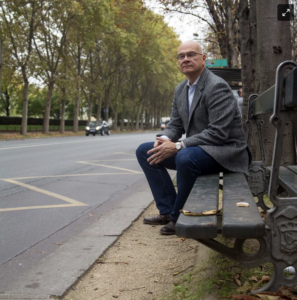5 Ways Tim Keller was the Anti-Celebrity Celebrity Pastor
I'm not sure Keller would love the selfies people are posting with him.

OPINION — When news hit that Tim Keller—the founding pastor of Redeemer Church in New York City and best-selling author of more than 20 books—died Friday at age 72 after battling pancreatic cancer, my timeline was flooded with gratitude and praise. Leaders noted that he had inspired their entire ministry approach. Others shared that his sermons and books had touched them in seasons of crisis and doubt.

My timeline also featured a lot of people sharing selfies and Zoom screenshots of themselves with Keller. Lecrae said he was star-struck by only three people: “Michael Jordan, Jay-Z, and Tim Keller.”
It was an interesting way to memorialize Keller, who didn’t lead with his image, and seemed rather averse to the spotlight.
Of course, Keller had a platform — an impressive one. At the time of his retirement from pastoring in 2017, according to Michael Luo’s New Yorker tribute, 5,000 people were attending multiple Redeemer services across NYC. Many of Keller’s books was bestsellers. According to Luo, Keller regularly appeared on MSNBC’s Morning Joe and wrote essays about faith and modern life for multiple national outlets.
Keller had an apologetic and evangelistic bent. He understood that he could use the tools of media to reach faith skeptics and faith shruggers. Keller combined the intellectual engagement of C.S. Lewis with the evangelistic zeal of Billy Graham. He was a quintessential evangelical — theologically conservative but socially engaged, clear in his convictions but gentle in his tone, and pragmatic in embracing media tools to reach people with the gospel.
The American church’s political fissuring — something Keller wrote and spoke about — means that Keller had and will continue to have critics on both the left and the right. From the right, his “winsomeness” is now perceived as weakness in a heightened cultural battle that demands warriors. From the left, his teachings on gender and sexuality are seen as oppressive and a tool of exclusion for already marginalized people.
When folks took to social media to praise Keller, it was almost a way of saying: Neither the left nor the right speaks for me. I’m signaling my own camp by aligning with Keller after his final hours on earth. I’m a Tim Keller kind of Christian.
The problem is, I’m not sure Tim Keller would want people thinking this way.
5 signs of humility
Many features of his ministry made Keller the anti-celebrity pastor, even while he had significant influence and reach.
(1) He had an unflashy ministry beginning.
After seminary, Keller started pastoring a blue-collar PCA church in rural Virginia. He served there for nine years. According to one review of Collin Hansen’s Keller biography, “only two of the members held a college degree, and most of the older members had never attached school beyond the eighth grade.”
There, Keller learned that being a pastor is not about charming and wowing people into belief with charisma, looks, and great lighting design. He later said,
“I … learned not to build a ministry on leadership charisma (which I didn’t have anyway!) or preaching skill (which wasn’t so much there early on) but on loving people pastorally and repenting when I was in the wrong. In a small town, people will follow you if they trust you—your character—personally, and that trust has to be built in personal relationships.”
(2) He eschewed megachurch culture.
When Keller planted Redeemer with his wife, Kathy, in 1989, they didn’t set out to become a megachurch. When church numbers swelled, it was largely due to a horrific event—the September 11 attacks—that shook New Yorkers to their core. But even before, in 1997, Redeemer leaders had created a vision plan for planting churches throughout the city. Each would partner together but have their own leaders and elders. As Kathy said at the time, “It is a vision for not being a megachurch.”
Eschewing the megachurch format kept Keller from becoming the main event. As I write in Celebrities for Jesus, the megachurch model is usually centered on the lead pastor—gifted and charismatic men who draw crowds with their passion and oratory skills. Lesser leaders revel in being the brand (or shout as much in staff meetings).
Keller could have leaned into this persona; it was the case that many young, educated professionals flocked to Redeemer to hear him preach. Yet realizing this, apparently Keller would rotate across Redeemer campuses and share the stage with other pastors so that worshipers couldn’t plan their attendance around him.
Access to MinistryWatch content is free. However, we hope you will support our work with your prayers and financial gifts. To make a donation, click here.
(3) He wasn’t focused on looks.
This might sound insulting, but I mean it in the best way: Tim Keller didn’t lead with his looks. His appearance and dress were pleasant, and pleasantly unremarkable. I loved this anecdote from Tyler Huckabee, that Keller declined doing a photoshoot for a magazine profile. (Free makeover and glossy images? Sign me up!) Huckabee said Keller just didn’t seem interested.
Another way of saying this: Keller valued substance over style. He didn’t need to be dressed in luxury clothing for New Yorkers to find his message compelling. Someone could be dressed like an L.L. Bean catalog, and still God would use their preaching.
(4) He waited before writing books.
Save for a few church-resources books with Christian imprints, Keller didn’t enter book publishing—a common route for national Christian celebrity status—until he was 58. The Reason for God: Belief in an Age of Skepticism was published in 2008, when the New Atheists were making their media splash. It reached the New York Times bestseller list and brought global attention to Keller and Redeemer.
Plenty other bestsellers would follow, but Keller had reached a point in his life and career that he had credibility to share wisdom. It’s also worth noting that his books were generally aimed at readers beyond the Evangelical Industrial Complex; Keller was intentional to communicate in a way that didn’t presume shared beliefs or subculture. Too many Christian celebrities build their careers by selling the same pablum to their consumers in repackaged ways. Keller didn’t really write with evangelical consumers in mind.
(5) He was curious about people as people.
Finally, I was moved by this account from Robin Jester Wootton, a self-identified “vocal pastor’s wife blogger” who was part of the PCA and eventually left. She says that Keller had reached out to her and engaged her after she had written critically about problems in the PCA. He continued to check in with Wootton, even after she had left the denomination. She writes:
I realized over the past year in my interactions that he was truly curious. He wanted to know and understand. He wanted to grasp the ideas and consider different approaches to any single topic. I loved that he didn’t just say, here’s what you have to think or do. . ..
Tim Keller listened. And that is a strange and magical gift I never would have expected in my whole life.
Healthy leaders have the time to treat people like people.
RESISTING FANDOM
Hagiography and hero worship are never stronger temptations than right after a beloved figure’s death. One Oregon pastor declared that Keller “was never of this world.” I’m sure his family members and closest friends would say otherwise.
Family and close friends are also likely now too busy attending to matters of the funeral and burial and quiet bereavement to post their favorite Keller anecdote. They don’t need to post the story or the photo of the time they touched the hem of his garment; to them, he was simply, wonderfully human.
It seems Tim Keller would be the first to insist that he was merely human, and that any glory belongs to Christ alone. Keller wasn’t Gandalf, you guys.
Further, I’m not sure he’d want anyone to think of themselves as a “Tim Keller Christian.” For him, and for us—who are starved for role models, mentors, and examples of famous Christians who end their race well—being an ordinary Christian is more than enough. —KB
This article was originally published at The Beaty Beat.
Main photo: Photo taken by Arianne Ramaker. Courtesy of TimothyKeller.com.



